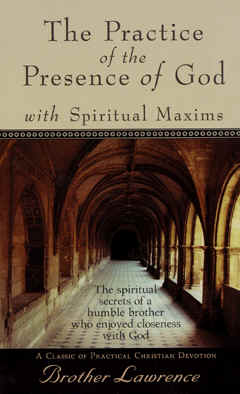 I am currently reading a Christian classic, The Practice of the Presence of God by Brother Lawrence. It's a fascinating glimpse into the life of a man whose career culminated in washing dishes and fixing sandals. He seemed remarkably satisfied.
I am currently reading a Christian classic, The Practice of the Presence of God by Brother Lawrence. It's a fascinating glimpse into the life of a man whose career culminated in washing dishes and fixing sandals. He seemed remarkably satisfied.
I started reading it because it is the foundational work in the spiritual discipline called "presence." I first learned about it when I read Holy Parenting. I saw references to it on a blog or two and then recently when I read Celebration of Discipline the book came up again. So, I looked it up on ccel.org (an online mostly free library of Christian Classics) and started to read.
The book is short and the translation I found was simple. The book however was a painful read on two fronts. First the humility of the man was astonishing. He didn't write the book. He didn't seem to see any need to. What is gathered together is several letters he wrote, one of which he begged the recipient not to share with others, and a few more short conversations where he described the discipline he practiced. Although people came from all over Europe to learn from him, he was a dishwasher. Not a cleric, priest or writer. He didn't start a movement, make a fortune or begin a monastery. There's no denomination named after him. He made the kitchen his life's work and that was enough.
I want to be more than I am sometimes.
That's a bald confession and hard to write. But my pride absolutely defeats me. I stand there in my own kitchen, elbow-deep in suds, and despite the audio Bible playing, despite the fact that I haven't even said my prayers today, I am day-dreaming about being something more. I don't have Brother Lawrence's humility. I am not close to being satisfied in my quiet work.
I hesitate to even whisper this to you. Because I am afraid that I'll get a load of comments destined to "make me feel better." I know that the work I already do is meaningful and I certainly don't suffer from low self-esteem (just the opposite!) Honestly, I don't need to think better of myself, I need to think about myself less! The very fact that I am focused on me is a symptom of the sin.
The other challenge the book brought to me is the discipline itself. He abandons himself entirely to God. He is constantly aware of the presence of God. He dwells with him every moment. Rather than this being an imaginative fancy, this thought is based in several Biblical truths. For instance Christians are constantly indwelt by the Holy Spirit- we are the mobile temple of God (1 Corinthians 6:19-20). Jesus promised to be with us always especially when we are together in prayer or worship (Matthew 18:20, 28:20). It's the literal meaning of his name- Immanuel- God with us (Matthew 1:23). The Father is described as being inescapable. Both David and Amos insist that whether we are an astronaut on the moon or a deep sea divers, whether we are alive or dead, God is with us (Psalm 139:7-12, Amos 9:2-4).
Being aware of God with us every moment has two profound effects. It makes sin much less tasty. Just imagine trying to enjoy a cozy gossip with God looking over your shoulder or God standing in the break room with you while you grumble about your boss. This practice also makes prayer much easier. The closest we ever come to praying without ceasing is when we recognize prayer is a conversation between us and God who is right there beside us. Like spending the day with a friend - we might not be actively speaking with them every moment, but we'd never be unaware of them. Imagining my ambitious little fantasy as a conversation with God makes me blush with shame.
This is where I am supposed to say that I've enjoyed The Practice of the Presence of God. But I haven't. Every time I open the website to read, I cringe. It's going to hurt. It always hurts. Not because the book has an accusing tone. Just the opposite-it's the joyful humility that's mortifying my pride.
If you've read it, let me know what you thought! Do you struggle with pride? How do you tackle it?
Helene
Scripture taken from the NEW AMERICAN STANDARD BIBLE(R), Copyright(c) 1960, 1962, 1963, 1968, 1971, 1972, 1973, 1975, 1977, 1995 by The Lockman Foundation. Used by permission.
No comments:
Post a Comment